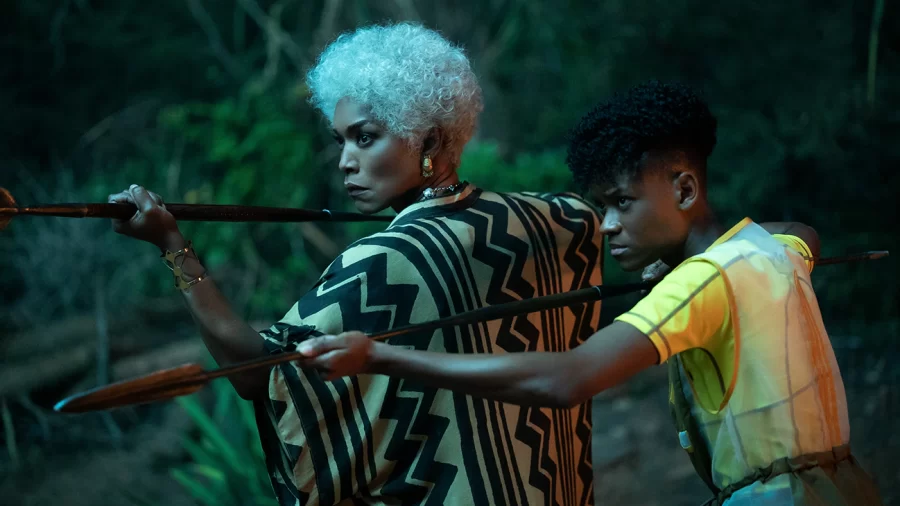“Black Panther: Wakanda Forever”: a touching, action-packed balancing act
Princess Shuri and Queen Ramonda defend the shores of Wakanda. “Black Panther: Wakanda Forever” is both an affecting tribute to Chadwick Boseman and a high-quality, edge-of-your-seat superhero film.
Minor spoilers for “Black Panther: Wakanda Forever”
“Black Panther: Wakanda Forever” opens with the main cast frantically moving around a high-tech lab. The camera work is jolting and disorienting, and the scene is filled with visceral, unexplained anxiety. It’s hard to tell what’s happening, except for one thing — King T’Challa is dying. King T’Challa is dead. Chadwick Boseman is dead.
“Black Panther: Wakanda Forever” is the sequel to Marvel’s highly-acclaimed 2018 film “Black Panther,” one of the studio’s most successful films. The movie is shadowed by the tragic, unexpected death of Boseman in 2020, the endlessly talented actor who played protagonist King T’Challa in the original “Black Panther.” As a result, “Wakanda Forever” was tasked with balancing the painful arc of grief with the unceasing, rapid superhero action of any Marvel film — a difficult mandate for any movie, let alone one following “Black Panther.”
Thankfully, “Wakanda Forever” delivers. Mostly.
The movie’s main failures are in its writing: it suffers from massive underdevelopment, both in the characters and plotlines, which makes the movie feel fragmented and confusing. But the film is otherwise compelling, and it honors Boseman’s legacy tenderly and powerfully.
The overall message of “Wakanda Forever” is one of grief. The traditional Marvel strategy of withholding significant tragedy until a film’s climax is partially subverted in this movie. The death of T’Challa pervades every part of “Wakanda Forever,” making the film a memorial to Boseman as much as an action-packed superhero flick. The protagonist, princess Shuri (played by Letitia Wright), is faced with the difficulty of coping with her brother’s untimely demise.
“Wakanda Forever” respects Boseman’s legacy and that of his character without being flippant or heavy-handed. Besides a few jokes, the movie doesn’t upset its often-somber mood, and it lets the grief of the moment register when it needs to. Its quieter moments of remembrance between dense action scenes feel genuine, and even when the pace picks up, it never feels irreverent.
However, the film covers far more than what happens inside the confines of Wakanda. Part of the film focuses on the Central Intelligence Agency’s desire for vibranium, a fictional metal that Wakanda’s high-tech, isolationist kingdom is built around. Part of it focuses on the underwater kingdom of Talokan and the film’s antagonist, Namor. Part of it focuses on a collegiate science prodigy whose life is constantly at risk for her knowledge of vibranium (and who will be the subject of a future Marvel TV series). And, of course, some of it is about Wakanda. That’s far too much, even for a nearly three-hour film. Most of the aforementioned plot lines are left unresolved and time skips unexplained.
The excessive plot points also cut into the character development of the vast majority of the cast. Many of the film’s secondary characters, from Wakandan leaders to villain sidekicks, simply start talking without being introduced. As someone who only saw the first film once when it came out, I found myself scratching my head at some of the characters, their introductions, and their motivations. Even main characters like Riri Williams, the aforementioned engineering prodigy, barely see exposition before their lives are threatened, and their motivations are left unclear throughout.
It’s not that the movie relies on Marvel nerd knowledge to comprehend, as many Marvel films have recently, nor are the characters stereotypical or uninteresting. Rather, the character development of “Wakanda Forever” simply feels incomplete, like significant portions of plot have been left out. Of course, Marvel isn’t known for its cohesive storylines or characters, but this film is egregious, even by their standards.
What the movie lacks in development though, it makes up for in acting and production prowess. Every character is portrayed stunningly. From the mourning, vengeful Shuri to the calculated matriarch Queen Ramonda (Angela Bassett) to Tenoch Huerta’s bitter, impulsive Namor, every major character’s acting is impassioned and nuanced, both in performance and dialogue.
The movie’s cinematography is also impressive, as expected from Marvel — its sequences are eye-catching, and the film’s focus on countless different settings around the world varies the movie without being too overwhelming. Veteran film composer Ludwig Göransson’s score is similarly magnificent: while it isn’t out of the ordinary for a Marvel movie, during some of the film’s most intense scenes, its pounding synths and ominous orchestration somewhat-literally blew me out of my chair.
“Wakanda Forever” does everything it needs to. It’s exhilarating in the signature Marvel fashion, and yet, it’s poignant and touching in a way that few superhero movies can ever dream of. While the film loses some of its effectiveness trying to balance a busy plot, it ultimately succeeds in most other departments. After a string of lukewarm films, “Wakanda Forever” is a flawed but strong return to form for Marvel and an affecting tribute to one of its most iconic actors.




